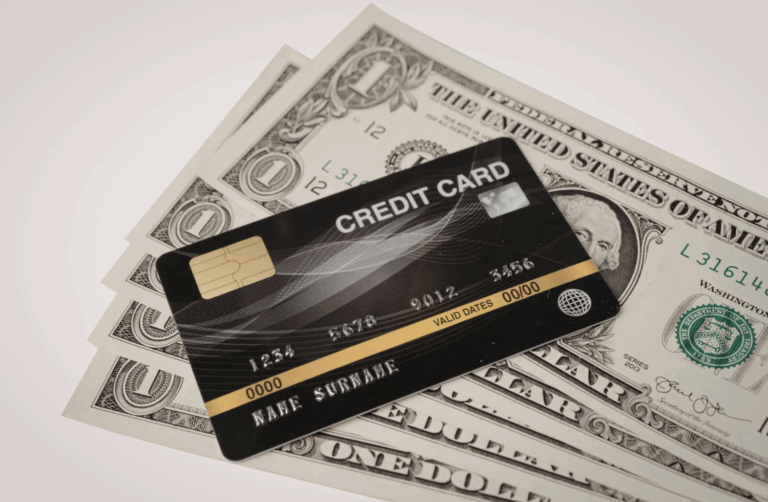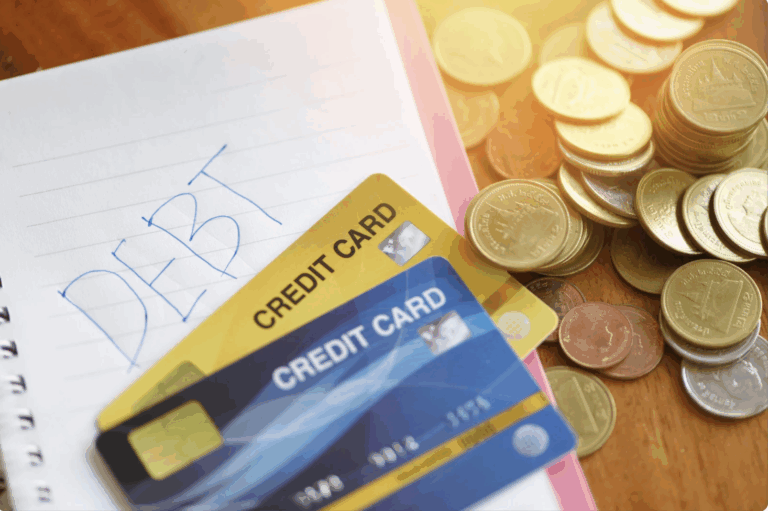When managing credit card debt, many people worry about the potential consequences of unpaid balances. One of the most severe actions a credit card company can take is placing a judgment lien on your real property — a situation that has many negative consequences and challenges.
Read on to learn how a credit card company can put a lien on your house, the legal processes involved, and the steps you can take to prevent this situation.
What Is a Credit Card Lien?
A credit card lien is a legal claim that a credit card issuer, debt collector, or collection law firm can place on a borrower’s property or assets as collateral to secure repayment of a debt. Unlike secured debt (where the loan is backed by collateral from the start, like a mortgage or car loan), credit card debt is unsecured debt that only becomes secured if a creditor obtains a judgment lien.
If a borrower defaults on their credit card payments, the lender may seek a court judgment to obtain judgment liens against the borrower’s real property. This means the lender has a legal right to sue, and if they win, potentially take possession of the property if the debt remains unpaid.
How Can a Credit Card Company Put a Lien on Your House?
A credit card company can place a lien on your house only under specific conditions. The following steps must happen first:
1. Default on Your Credit Card Debt
The process of having a lien placed on your property starts with you defaulting on your credit card debt. This means you failed to make payments for a certain period of time — at least 30 days, but usually 180 days or more.
2. Creditor Files a Lawsuit
The credit card company must then file a lawsuit against you to recover the unpaid debt. This involves taking the case to court and seeking a legal judgment. This is often done through debt collection attorneys hired by the creditor.
3. Court Issues a Judgment
The court must rule in favor of the credit card company, granting them a judgment for the amount owed. This judgment legally recognizes the debt and your obligation to pay. If you fail to appear in court or do not respond to the lawsuit documents after being served, you’ll end up with a default judgment against you.
4. Judgment Lien is Obtained
After obtaining a judgment, the credit card company can request the court to place judgment liens on your real property. This step may involve additional legal processes, depending on the jurisdiction. A judgment can also lead to other actions such as wage garnishment or bank account levies.
5. Lien is Recorded
The judgment lien must be recorded with the appropriate local government office, such as the county recorder or clerk’s office, to be legally binding. This public record notifies other creditors and potential buyers of the lien on the property.
6. You Are Notified
You’re typically notified of the lien placement, and it becomes part of the public record. This can affect your credit report and ability to sell or refinance the property.
What Are Your Options If Facing a Lien?
If you’re facing judgment liens on your property due to unpaid credit card debt, several options are available to address the situation.
Contest the Debt
Under the Fair Debt Collection Practices Act (FDCPA), you have the right to request debt validation in writing within 30 days of receiving the initial notice. Ask for detailed information about the debt, including the original creditor, the amount owed, and documentation proving the debt is yours. If the creditor can’t validate the debt properly, you could have the case dismissed.
Settle Out of Court
You can negotiate with the credit card company by offering a lump-sum settlement or requesting a structured repayment plan. Determine how much you can realistically afford, then reach out to discuss your situation. Start with an offer lower than the total amount owed but within your budget. Once you reach an agreement, get the settlement terms in writing. Working with a debt help attorney can improve your chances of reaching a favorable deal.
Consider Bankruptcy
Deciding whether to file for bankruptcy to resolve unpaid credit card debt is a significant decision that can have long-lasting consequences for your finances.
There are two common types of bankruptcy you could consider, assuming you qualify:
- Chapter 7 bankruptcy: This can discharge most unsecured debts, including credit card debt, giving you a fresh start. However, you may have to liquidate some of your assets to repay creditors (although some assets may be exempt).
- Chapter 13 bankruptcy: Allows you to create a repayment plan to pay off your debts over three to five years, with any remaining unsecured debt potentially discharged at the end. This option requires you to commit to a budget and make regular payments.
Filing for bankruptcy triggers an automatic stay, which stops most collection activities, including lawsuits and liens. However, bankruptcy significantly affects your credit score and remains on your credit report for seven to 10 years. An attorney can help you determine if bankruptcy is the right choice.
What Are the Implications of a Lien on Your House?
Having judgment liens placed on your house for unpaid credit card debt has several serious implications:
- Impact on homeowners: The lien amount is deducted from your home equity, reducing financial benefits from selling or refinancing. A lien can also complicate securing financing for home improvements.
- Effect on credit score: A lien on your property is a public record that can negatively impact your credit score, making it harder to obtain new credit or loans.
- Selling or refinancing your home: A lien clouds your property’s title, complicating the process of selling or refinancing your home until you pay off the debt and remove the lien.
- Priority of liens: Judgment liens are typically subordinate to other liens like mortgages and property taxes. This means if your home is sold, property taxes and mortgage debt are paid first, then judgment liens.
How Can You Remove a Lien?
If there’s a lien on your home, it’s in your best interest to have it removed as soon as possible. Here are some options to consider:
| Option | How It Works | Considerations |
|---|---|---|
| Pay Off the Debt | Pay the full amount owed, including interest and fees | Most straightforward; lien is released once paid |
| Negotiate a Settlement | Contact creditor to settle for a reduced amount | May accept less in exchange for releasing the lien |
| File for Bankruptcy | Discharge unsecured debts through Chapter 7 or 13 | Impacts credit for 7-10 years; consult attorney |
| Legal Challenge | Challenge lien in court if invalid or improperly filed | Requires attorney; only viable if lien has errors |
| Sell the Property | Use sale proceeds to satisfy the lien | Lien must be addressed before sale finalizes |
How Can You Prevent a Lien on Your House?
Preventing judgment liens from being placed on your house involves taking a proactive approach to manage your debt before it escalates. Here are key strategies:
- Make timely payments: Pay your credit card bills on time, even if just the minimum. Set up automatic payments or reminders to avoid missing due dates.
- Create a realistic budget: Account for all expenses and income to ensure you can consistently cover credit card payments. If struggling, consult a financial professional for guidance.
- Communicate with creditors: If you’re having trouble making payments, contact your credit card issuer to discuss alternative payment plans or hardship programs. Early communication can prevent legal action.
- Consider debt consolidation or counseling: Consolidate debt into a single loan with lower interest, or seek help from a nonprofit credit counseling agency to create a debt management plan.
- Understand your legal protections: Be aware of state and federal exemptions that protect certain assets. In some states, filing a homestead exemption can provide additional protection for your primary residence from creditors. A homestead exemption protects a certain amount of equity in your home from judgment liens, with exemption amounts varying by state.
- Seek professional help early: If you have significant debt and can’t make regular payments, consult with a debt relief attorney before issues escalate. They can help you understand exemptions, negotiate with creditors, or explore options like debt settlement.
Key Takeaways
- Credit card companies can place liens, but only after winning a lawsuit – They must obtain a court judgment first
- Judgment liens attach to real property – This includes your house and other real estate you own
- Homestead exemptions may protect your home – Check your state’s laws for available protections
- Multiple options exist to address liens – Settlement, payment, bankruptcy, or legal challenge
- Prevention is key – Pay on time, communicate with creditors, and seek help early
- Property taxes and mortgages take priority – These secured debts are paid before judgment liens if property is sold
Tayne Law Group is a New York-based debt relief law firm. We’ve been helping clients find resolutions for their credit card debt for over 20 years. If a creditor is suing you or has placed a lien on your property, call us today. We may be able to help you put together a strategy to resolve your debt.
Give us a call at (866) 890-7337 for a free phone consultation with our experienced and helpful staff. You can also fill out our short contact form, and someone from the office will contact you. We never sell or share your information and all discussions are confidential. All work is done by our in-house team at the Tayne Law Group, P.C.
Frequently Asked Questions
A credit card company cannot directly take your house, but they can place judgment liens on your real property after obtaining a court judgment. The lien attaches to your property and must be paid when you sell or refinance. In rare cases, if the lien is substantial and you have significant equity, they could potentially force a sale, but this is uncommon.
A homestead exemption is a legal provision that protects a certain amount of equity in your primary residence from judgment liens and creditors. The exemption amount varies by state — some states like Florida and Texas offer unlimited protection, while others have specific dollar limits. This protection only applies to your primary residence, not investment properties.
Secured debt (like a mortgage or car loan) is backed by collateral from the start of the loan. A judgment lien converts unsecured debt (like credit card debt) into secured debt only after a creditor sues you and wins a court judgment. Property taxes are also a type of secured debt that takes priority over judgment liens.
The duration of judgment liens varies by state, typically lasting 5 to 20 years. In many states, judgment liens can be renewed before they expire, potentially lasting indefinitely until the debt is paid. The lien remains attached to your property during this time.
Yes, you can sell your house with a lien on it, but the lien must be satisfied (paid off) from the sale proceeds before the sale can be finalized. The lien will be paid after property taxes and mortgage debt but before you receive any remaining funds. If the sale proceeds don’t cover all liens and debts, you may need to negotiate with the lienholder or bring additional funds to close the sale.
If you’re sued, respond to the lawsuit immediately — do not ignore it. Failing to respond can result in a default judgment. Contact a debt relief attorney who can review your case, help you understand your options, and represent you in court. You may be able to negotiate a settlement before judgment is entered.





